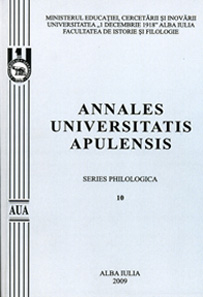An Interdisciplinary Approach to Corpus-Based Research: The Case of Translation Studies
An Interdisciplinary Approach to Corpus-Based Research: The Case of Translation Studies
Author(s): Mona ArhireSubject(s): Language and Literature Studies
Published by: Universitatea »1 Decembrie 1918« Alba Iulia
Keywords: corpus-based research; interdisciplinarity; translation studies; intercultural communication; contrastive analysis
Summary/Abstract: Interdisciplinarity has become a virtue of both modern research and applied disciplines, opening up multitudes of perspectives. The case of corpusbased studies is among the most stimulating one, exploiting and/ or depending on joint domains, and unfolding ever-new potential to a variety of disciplines taken separately or in sundry of combinations. The particular situation that this paper intends to discuss is related to corpus-based translation studies, a fairly young discipline within the well-established translational field. It should be pertinent to assert that the Romanian research community is taking baby-steps in this respect if we were to acquire an overall image of the international endeavours, which offer evidence of the fact that corpus-based translational investigation takes the upperhand, being superior to traditional research. That is why, the introduction of this field of study in the Romanian research environment is crucial in order to add up new theories to the existing ones and to improve the translation performance of Romanian translators and thus enhance intercultural communication. The paper aims at presenting the status of on-line available corpora, along with considerations as regards the text genres, types, reliability, consistency, userfriendliness, authorship and purposes. We also have in view an overall account of the disciplines (both within humanistic and exact sciences) using corpora for investigation and the issue of interdisciplinary involved and needed in such approaches, focussing on the linguistic component of corpus-based studies. The conclusions draw on the participation of Romanian linguistic research teams in such encounters, as well as on the presence of the Romanian language as a language pair in contrastive corpus-based investigation. Such an undertaking should be of interest not only to the research environment, but also to the academic and professional contexts, since it can offer new perspectives in the training of future professionals within several fields, thus preparing the grounds for better professional performance. With particular reference to corpora in the translational field, we can assert that the contributions to the research, academic, and professional domains converge to a common finality: increased effectiveness in intercultural communication, an issue of utmost importance due to Romanian’s extending contacts abroad.
Journal: Annales Universitatis Apulensis. Series Philologica
- Issue Year: 11/2010
- Issue No: 2
- Page Range: 146-158
- Page Count: 13
- Language: English

